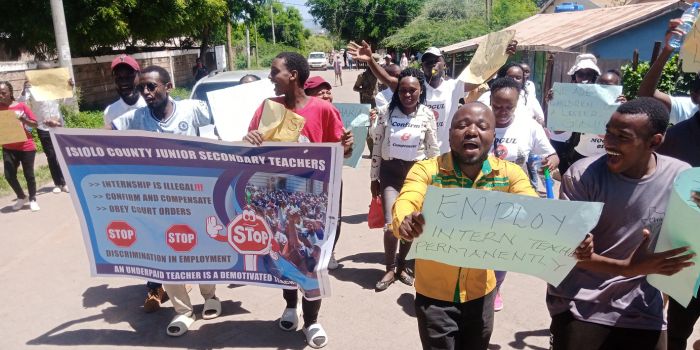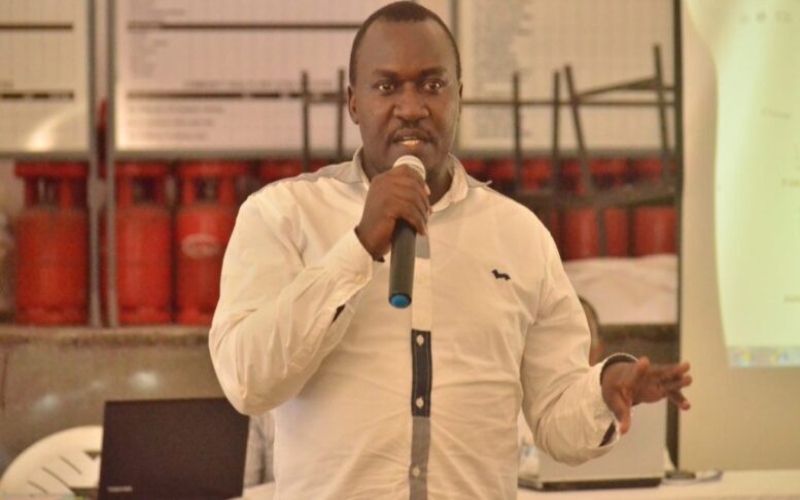From classrooms to the streets: Inside a tough and turbulent year for Kenyan teachers

From primary schools to universities, the year was punctuated by multiple strikes that disrupted learning and exposed deep-seated issues.
“Solidarity forever, for the union makes us strong!" This was the song that echoed across Kenya throughout 2024 as teachers united in their fight for better pay, improved working conditions, and the fulfilment of long-standing promises.
From primary schools to universities, the year was punctuated by multiple strikes that disrupted learning and exposed deep-seated issues within the country’s education sector.
More To Read
- TSC faces Sh5 billion shortfall as teacher promotions stall
- Government defends use of intern teachers in junior schools amid calls for permanent jobs
- Labour Ministry warns KUPPET over ‘illegal’ election plans using suspended amendments
- TSC extends junior school internship contracts by another year despite growing unrest
- MPs propose part-time roles for TSC chair, commissioners to save Sh70 million annually
- Teachers to stay in same schools after promotions under new TSC policy
The unrest began in April when Junior Secondary School (JSS) teachers took to the streets, demanding permanent employment and fair compensation after working as interns for two years.
Their protests brought learning to a standstill in several counties including Narok, Nyeri, Meru, Nyamira, and Machakos.
As they pushed for pay parity with their permanently employed counterparts, over 50,000 intern teachers boycotted classes, leaving learners stranded.
The interns, engaged under a Teachers Service Commission (TSC) programme launched in 2019, cited a court ruling declaring their employment terms illegal.
Justice Byram Ongaya found that TSC violated the law by hiring qualified graduates as interns under substandard terms.
The teachers had been contracted for 11 months starting in February 2023, with their contracts ending in December the same year. They expected permanent employment but continued to receive significantly lower stipends — Sh15,000 for primary school interns and Sh20,000 for those in secondary schools — compared to over Sh60,000 earned by permanent staff.
Intern teachers criticised TSC for failing to honour the court's ruling and demanded immediate absorption into permanent positions. A representative, Boniface Omari, highlighted the disparity, stating that primary school interns were left with Sh13,000 after deductions, including the recently introduced Housing Levy.
Budgetary constraints
Despite these demands, the Court of Appeal temporarily suspended Justice Ongaya's decision, citing budgetary constraints. TSC, led by CEO Nancy Macharia, argued that implementing the ruling would disrupt its operations, as no funds had been allocated for hiring the interns permanently.
As the strike persisted, the government and National Assembly intervened, urging teachers to suspend their protests to allow the budget process to proceed.
In June, the striking teachers temporarily halted their demonstrations to enable Parliament to allocate funds for their recruitment. However, TSC escalated tensions by terminating the contracts of 742 JSS interns for failing to respond to show-cause letters regarding their absence during protests.
TSC defended its actions, stating that the affected teachers could appeal for a review of their cases. Macharia encouraged those impacted to follow the due process while reiterating TSC’s commitment to resolving the matter within the framework of the law.
But the teachers' strike was far from over.
Nationwide strike
In August, the Kenya Union of Post Primary Education Teachers (Kuppet) and the Kenya Union of Teachers (KNUT) declared a nationwide strike, attributing their action to the government’s failure to allocate Sh13.3 billion for the implementation of the second phase of the 2021-2025 Collective Bargaining Agreement (CBA).
The agreement, which had been negotiated, signed, and deposited in court, was deemed critical by the unions.
Kuppet Secretary-General Akelo Misori explained that the first phase of the CBA addendum dated back to July 2023 and was implemented the following month.
However, teachers missed their salary increment for July 2024, with Misori accusing the TSC of ignoring their demands for better working conditions and fair compensation.
The union further criticised TSC for failing to initiate negotiations for a new CBA to succeed the existing agreement. Misori described the inaction as a blatant disregard for teachers' welfare, pointing out that the TSC’s mishandling of the medical insurance cover had left many teachers unable to access healthcare as hospitals stopped honouring their schemes.
"This blatant disregard for the wellbeing of teachers is unacceptable and cannot be tolerated any longer. We deserve better, we deserve to be heard, and we deserve to be treated with respect. TSC has compromised our medical insurance cover, putting our health and well-being at risk. Many hospitals no longer honour the medical schemes for the teachers," Misori said.
KNUT, however, withdrew from the strike before it began on August 26, citing progress in addressing unresolved issues through administrative channels. The union stated that its decision was based on careful consideration of the government's commitment and the broader education agenda.
Despite KNUT’s withdrawal, Kuppet held firm, rejecting the government’s attempts to mediate, which they said failed to address the teachers' immediate concerns. Even after the High Court ordered a suspension of the strike, the union remained resolute.
Misori insisted the strike would continue, blaming the TSC for its refusal to engage in meaningful dialogue.
The strike severely disrupted learning for two weeks, with some principals sending students home due to the lack of teachers.
In Nakuru County, students from Jomo Kenyatta Boys and Jomo Kenyatta Girls secondary schools were sent home, leaving parents frustrated and urging the government to resolve the stalemate.
Eventually, Kuppet called off the strike following a meeting with TSC, directing teachers to resume work. Although not all issues were resolved, the union urged its members to return to class as negotiations continued.
University workers
Attention soon shifted to university institutions in early September, as lecturers and support staff launched a walkout over delays in salary payments and stalled negotiations for the 2021–2025 CBA.
Members of the Universities Academic Staff Union (UASU) and Kenya Universities Staff Union (KUSU) staged protests, which were met with police response, including the use of tear gas as they marched to present petitions to government offices.
The protests paralysed academic programmes, worsening an already disrupted calendar.
Meanwhile, grasses in school compounds bore silent witness to the grief of stranded students, whose dreams and ambitions seemed to fade with each passing day of inactivity.
In response, an inter-ministerial negotiating team was formed to address the lecturers' grievances, leading to a temporary suspension of the strike.
However, the strike resumed again with lecturers accusing the government of failing to honour the return-to-work agreement signed on September 26, 2024. They rejected the government’s Sh4.3 billion verbal offer, insisting on the Sh9.7 billion outlined in the CBA.
With the strike extending into its fourth week, lobby groups urged the government to extend the semester to compensate for lost time. After weeks of disruptions, lecturers agreed to resume work on November 25, following an agreement with the Inter-Public Universities Councils Consultative Forum (IPUCCF).
The deal included a phased implementation of the CBA, with Sh4.3 billion allocated for the first tranche covering nine months up to June 2025, and the remaining Sh5.4 billion to be disbursed in two instalments. Lecturers expressed satisfaction with the Ministry of Education’s commitment, bringing the industrial action to an end.
While the government has pledged to increase education funding in the next financial year, the persistent strikes highlighted systemic failures in addressing teachers' needs.
As the new year begins, the struggles within the education sector remain a stark reminder of the urgent need for reforms.
Top Stories Today













































